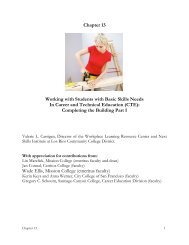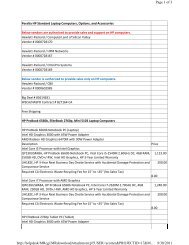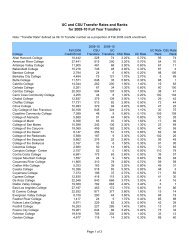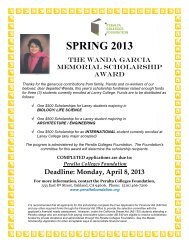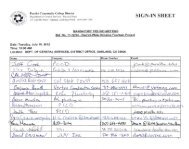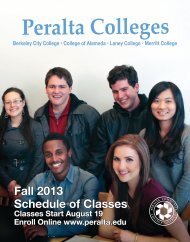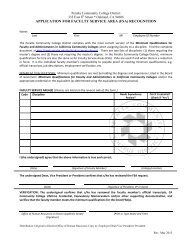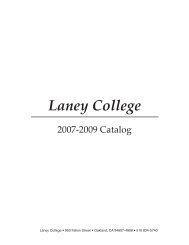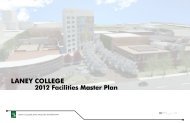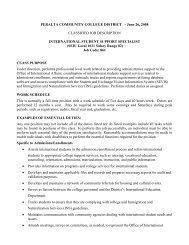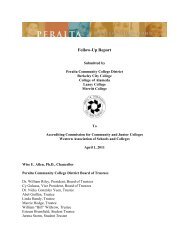200district policies and procedures3. The conduct has the purpose or effect of havinga negative impact upon a student’s academicperformance, or of creating an intimidating, hostile,or offensive educational environment.4. Submission to, or rejection of, the conduct by astudent is used as the basis for any decision affectingthe individual regarding benefits and services,honors, programs, or activities available at orthrough the educational institution.5. Any other such conduct that may have an effect on astudent’s learning environment or his or her abilityto enjoy any privileges or benefits provided by theDistrict.The prohibition of racial harassment similarly enjoinsconduct or incidents based on race that may interferewith or limit the ability of an individual to participatein or benefit from the services, activities, or privilegesprovided by the District.The prohibition of disability harassment similarly enjoinsconduct or incidents based on disability that may excludean individual from participation in or be denied thebenefit of the services, programs, or activities providedby the District to other non-disabled students.A harassing environment is created if conduct of a sexualor racial nature or conduct based on student’s disabilityis sufficiently severe, persistent, or pervasive to limita student’s ability to participate in or benefit from theeducation program by the District or to create a hostileor abusive educational environment.C. Examples of Prohibited HarassmentSexual, racial, or disability harassment includes, but isnot limited to, the following examples of conduct that isundertaken because of the sex, race or disability of thestudent victim:1. Unwanted physical touching (beyond normalgreetings).2. Displays of offensive materials, objects, photos, etc.,with a sexual, racial, or disabled theme.3. Situations affecting a student’s studying and learningconditions and making the learning environmentunpleasant and uncomfortable, whether the actionsare purposeful or not.4. Verbal insults (in reference to gender, race, sexualorientation, or disability).5. Rumors designed to cause the individual emotionaldistress or place him or her in a bad light.6. Physical assault.7. Unwelcome direct propositions of a sexual nature.8. Subtle pressures for unwelcome sexual activity, anelement of which may be conduct such as repeatedand unwanted staring.9. A pattern of conduct not legitimately related tothe subject matter of a course, which is sufficientlysevere, persistent, or pervasive to limit a student’sability to participate in or benefit from the educationprogram or to create a hostile or abusive educationalenvironment, that includes one or more of thefollowing:(a) comments of a sexual/racial nature or whichare demeaning or derogatory based on adisability, or(b) sexually explicit statements, questions, jokes, oranecdotes.10. Unwanted attempts to establish a personalrelationship.<strong>11</strong>. A pattern of conduct that would cause discomfortor humiliate, or both, a reasonable person at whomthe conduct was directed that may include one ormore of the following:(a) unnecessary touching, patting, hugging, orbrushing against a person’s body,(b) remarks of a sexual nature about a person’sanatomy or clothing, or(c) remarks about sexual activity or speculationsabout a previous sexual experience.All persons should be aware that conduct towards astudent that is not specifically identified in this policymay nonetheless constitute impermissible sexual, racialor disability harassment.D. Academic Freedom and Freedom of SpeechAs participants in a public institution, the faculty and staffof the <strong>Peralta</strong> Community College District enjoy significantfree speech protections found in the First Amendment ofthe United States Constitution and Article I Section I of theCalifornia Constitution. The right of academic freedom
district policies and procedures201includes a special area of protected speech. Consistentwith the principles of academic freedom, course contentand teaching methods remain the province of individualfaculty members. Academic freedom, however, is notlimitless. Academic freedom does not protect classroomspeech that is unrelated to the subject matter of the courseor in violation of federal or state anti-discriminationlaws. Some speech may constitute environmental sexualharassment, harassment based on another impermissiblecharacteristic or discrimination. If a faculty memberengages in unwelcome sexual behavior or other improperbehavior based on a characteristic protected by thispolicy that has the purpose or effect of unreasonablyinterfering with an employee’s work environment or astudent’s academic performance or creates a hostile andintimidating work or academic environment, then it mayconstitute environmental harassment or discrimination,as outlined in Board Policy and these implementingprocedures.The District must balance these two significant interests:the right of academic freedom and the right to be free fromdiscrimination and harassment. The First Amendmentprotections, including those of academic freedom, arenot absolute. When a faculty member raises academicfreedom as a defense against charges of discriminationor discriminatory harassment, the District must examinethe nature and context of the faculty member’s behavior.A key to this examination is determining whether thebehavior of the faculty member is related to his or herlegitimate academic judgments within the context offurthering the institution’s legitimate mission.Nothing in the District’s Discrimination and DiscriminatoryHarassment Policy should be construed to prevent facultymembers from rigorously challenging fundamental beliefsheld by students and society. These challenges shouldbe done in a manner that, in the professional judgmentof the faculty member, is most pedagogically advisable.Indeed, this is at the core of academic freedom; however,faculty members may not interject into the academicsetting an element of discrimination or discriminatoryharassment that is unrelated to any legitimate educationalobjective. Nor, may a faculty member create, or allow, theeducational setting to be so charged with discriminationor discriminatory harassment, that our students areprevented from effectively participating in the academicenvironment. As such, faculty members must beaware that the District will investigate and respond toemployee or student complaints that involve coursecontent in accordance with its general discriminationand discriminatory harassment policy and facultymembers may be subject to discipline for egregiousconduct, in the same manner as provided in Board Policyand any implementing procedures for all other Districtemployees.The <strong>Peralta</strong> Community College District is committed toinsuring that the academic freedom rights of our facultyare secure, and to insuring our students an academicenvironment free of discrimination and harassment.Nothing in this section is intended to abrogate rights ofAcademic Freedom stated in the collective bargainingagreement with the <strong>Peralta</strong> Federation of Teachers.E. Consensual Relationships1. Definitions(a) The terms “instructors” and “faculty member”are defined as any person who teaches inthe District, is in an academic position, orby virtue of their position has control orinfluence on student performance, behavior,or academic career.(b) A “District employee” is defined as any personwho is employed by the <strong>Peralta</strong> CommunityCollege District, or acts as its agent andoperates within the District’s control.2. RationaleThe District’s educational mission is promoted byprofessionalism in faculty/student, as well as supervisor/subordinate, relationships. Professionalism is fosteredby an atmosphere of mutual trust and respect. Actionsof faculty members and supervisors that harm thisatmosphere undermine professionalism and hinderfulfillment of the educational mission. Trust and respectare diminished when those in positions of authority abusetheir power in such a context as to violate their duty to theeducational community and undermine the trust placedin the District as a public employer and an educationalinstitution.3. Ethical ViolationRecognizing that the unequal power of adult consentingparties is inherent in consensual relationships betweensupervisor and employee or student and teacher, theDistrict will view it as unethical behavior if facultymembers or supervisors engage in romantic relationswith students enrolled in their classes or employees undertheir supervision even though both parties appear to haveconsented to the relationship.4. Presumption of a Policy ViolationThe faculty member or supervisor who contemplates aromantic relationship with a student or employee mustrealize the complexity of the situation and its potentialnegative consequences. Regardless of consent or mutualattraction, the faculty member or supervisor generallywill be judged guilty of sexual harassment if anycomplaint eventually emerges, either from the partnerin the relationship or from his or her fellow studentsor co-workers. A romantic relationship between anyminor employee or student and an adult employee ispresumptively deemed not to be a consensual relationshipand constitutes sexual harassment.
- Page 3 and 4:
2009-2011 CATALOG555 Ralph Appezzat
- Page 6 and 7:
College of Alameda AdministrationOf
- Page 8 and 9:
telephone numbersTelephone NumbersC
- Page 10 and 11:
ACADEMIC CALENDARFall Semester 2009
- Page 12 and 13:
10WELCOME!Who we are, what we do,an
- Page 14 and 15:
12WELCOME TO COLLEGE OF ALAMEDA•
- Page 16 and 17:
14GENERAL INFORMATIONCampus........
- Page 19 and 20:
GENERAL INFORMATION17Accuracy State
- Page 21 and 22:
College InformationCollege INFORMAT
- Page 23 and 24:
College INFORMATION21Returned check
- Page 25 and 26:
College INFORMATION23matriculation
- Page 27 and 28:
College INFORMATION25Exención del
- Page 29 and 30:
College INFORMATION27
- Page 31 and 32:
College INFORMATION29College HourTh
- Page 33 and 34:
STUDENT FINANCIAL AID31General Stat
- Page 35 and 36:
student financial aid33Financial Ai
- Page 37:
35• A student may repeat a course
- Page 41 and 42:
services FOR STUDENTS39Intercollegi
- Page 43 and 44:
services FOR STUDENTS41ASCOA is loc
- Page 45 and 46:
services FOR STUDENTS43basis. The e
- Page 47 and 48:
Degrees and ProgramsDEGREES AND PRO
- Page 49 and 50:
DEGREES AND PROGRAMS47communication
- Page 51 and 52:
DEGREES AND PROGRAMS49College of Al
- Page 53 and 54:
DEGREES AND PROGRAMS51University of
- Page 55 and 56:
DEGREES AND PROGRAMS532009-2010 Cal
- Page 57 and 58:
DEGREES AND PROGRAMS55Intersegmenta
- Page 59 and 60:
DEGREES AND PROGRAMS57Students who
- Page 61 and 62:
Vocational/Technical programs offer
- Page 63 and 64:
AREAS OF STUDY FOR DEGREES & CERTIF
- Page 65 and 66:
Description of CoursesDescription o
- Page 67 and 68:
african-american studies (afram)65A
- Page 69 and 70:
anthropology (anthr)67ANTHR 1Introd
- Page 71 and 72:
Apparel Design & Merchandising (ADA
- Page 73 and 74:
Apparel Design & Merchandising (ADA
- Page 75 and 76:
apprenticeship program (appr)73APPR
- Page 77 and 78:
apprenticeship program (appr)75APPR
- Page 79 and 80:
art (art)77Degree Major Requirement
- Page 81 and 82:
ARTS AND HUMANITIES - asian/asian-a
- Page 83 and 84:
AUTO BODY AND PAINT(AUTOB)auto body
- Page 85 and 86:
AUTOMOTIVE TECHNOLOGY(ATECH)automot
- Page 87 and 88:
automotive technology (atech)85Driv
- Page 89 and 90:
automotive technology (atech)87ATEC
- Page 91 and 92:
aviation MAINTENANCE TECHNOLOGY (AM
- Page 93 and 94:
aviation MAINTENANCE TECHNOLOGY (AM
- Page 95 and 96:
AVIATION OPERATIONS(AVIAO)AVIATION
- Page 97 and 98:
BIOLOGY (BIOL)95Instructor Ann Kirc
- Page 99 and 100:
usiness (bus)97BUSINESS(BUS)There a
- Page 101 and 102:
usiness (bus)99Certificate of Achie
- Page 103 and 104:
usiness (bus)101BUS 49Independent S
- Page 105 and 106:
usiness (bus)103BUS 236Records Mana
- Page 107 and 108:
CHEMISTRY (CHEM)105CHEM 50Beginning
- Page 109 and 110:
COMMUNICATION(COMM)COMMUNICATION (C
- Page 111 and 112:
COMPUTER INFORMATIONSYSTEMS(CIS)com
- Page 113 and 114:
computer information systems (CIS)1
- Page 115 and 116:
computer information systems (CIS)1
- Page 117 and 118:
computer information systems (CIS)1
- Page 119 and 120:
COUNSELING(COUN)COUNSELING (COUN)11
- Page 121 and 122:
DANCE (DANCE)119DANCE(DANCE)DANCE 1
- Page 123 and 124:
DENTAL ASSISTING(DENTL)DENTAL ASSIS
- Page 125 and 126:
DENTAL ASSISTING (DENTL)123DENTL 22
- Page 127 and 128:
DENTAL ASSISTING (DENTL)125DENTL 22
- Page 129 and 130:
DIESEL MECHANICS (DMECH)127Degree M
- Page 131 and 132:
DIESEL MECHANICS (DMECH)129DMECH 49
- Page 133 and 134:
ENGLISH(ENGL)english (ENGL)131The A
- Page 135 and 136:
english (ENGL)133ENGL 49Independent
- Page 137 and 138:
english (ENGL)135ENGL 268BBasic Rea
- Page 139 and 140:
ENGLISH AS A SECOND LANGUAGE (ESL)1
- Page 141 and 142:
FOREIGN LANGUAGEs(FLANG)FOREIGN LAN
- Page 143 and 144:
GEOGRAPHY(GEOG)GEOGRAPHY (GEOG)141W
- Page 145 and 146:
GERMAN (GERM)143GERMAN(GERM)GERM 1A
- Page 147 and 148:
HISTORY(HIST)HISTORY (HIST)145To st
- Page 149 and 150:
HISTORY (HIST)147HIST 12History and
- Page 151 and 152: HUMANITIES(HUMAN)HUMANITIES (HUMAN)
- Page 153 and 154: HUMANITIES (HUMAN)151HUMAN 51CLatin
- Page 155 and 156: LEARNING RESOURCES (LRNRE)153LRNRE
- Page 157 and 158: LIBERAL ARTSLIBERAL ARTS155The Libe
- Page 159: LIBERAL ARTS157M/LAT 18B History an
- Page 162 and 163: 160 LIBERAL ARTSNote: Students must
- Page 164 and 165: 162 MATHEMATICS (MATH)MATHEMATICS(M
- Page 166 and 167: 164 MATHEMATICS (MATH)MATH 49Indepe
- Page 168 and 169: 166MEXICAN AND LATIN-AMERICAN STUDI
- Page 170 and 171: 168 MUSIC (MUSIC)MUSIC(MUSIC)In stu
- Page 172 and 173: 170 MUSIC (MUSIC) - NATURAL SCIENCE
- Page 174 and 175: 172 PHILOSOPHY (PHIL)PHIL 10Logic3
- Page 176 and 177: 174 PHYSICAL EDUCATION (PE)PE 2Aero
- Page 178 and 179: 176 PHYSICAL SCIENCE (PHYSC)PHYSICA
- Page 180 and 181: 178 POLITICAL SCIENCE (POSCI)POLITI
- Page 182 and 183: 180PSYCHOLOGY(PSYCH)PSYCHOLOGY (PSY
- Page 184 and 185: 182social and behavioralsciencesSee
- Page 186 and 187: 184SPANISH(SPAN)SPANISH (SPAN)The A
- Page 188 and 189: 186VIETNAMESE(VIET)VIETNAMESE (VIET
- Page 190 and 191: 188 ACADEMIC REGULATIONS, POLICIES
- Page 192 and 193: 190 ACADEMIC REGULATIONS, POLICIES
- Page 194 and 195: 192ACADEMIC REGULATIONS, POLICIES A
- Page 196 and 197: 194 ACADEMIC REGULATIONS, POLICIES
- Page 198 and 199: 196ACADEMIC REGULATIONS, POLICIES A
- Page 200 and 201: 198 district policies and procedure
- Page 204 and 205: 202district policies and procedures
- Page 206 and 207: 204district policies and procedures
- Page 208 and 209: 206 district policies and procedure
- Page 210 and 211: 208 district policies and procedure
- Page 212 and 213: 210 district policies and procedure
- Page 214 and 215: 212 district policies and procedure
- Page 216 and 217: 214 district policies and procedure
- Page 218 and 219: 216district policies and procedures
- Page 220 and 221: 218 district policies and procedure
- Page 222 and 223: 220district policies and procedures
- Page 224 and 225: 222 district policies and procedure
- Page 226 and 227: 224 faculty/staffCamara, JoeCollege
- Page 228 and 229: 226 faculty/staffLeonard, MimiEngli
- Page 230 and 231: 228 faculty/staffScott, Bishop T.Ps
- Page 232 and 233: 230indexIndexAAbility to Benefit...
- Page 234 and 235: 232 indexDue Process:Student Conduc
- Page 236 and 237: 234 indexPrograms Offered at Other
- Page 238 and 239: 236 MapsCampus MapBuilding GuideA 1



